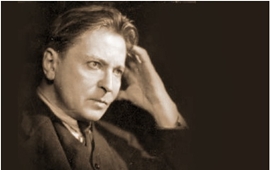> [Archived] Recommendations

The 'George Enescu' Week - Polyphonies, 18th-22nd August
During these five days I would like to offer you my own opinion regarding the composer; I rediscovered him listening to his music and reading books about him, among these books being the ones signed by Alain Cophignon and Ladislau Csendes, the latter one exploring the last years of George Enescu`s life, using the documents preserved in the National Council for the Securitate Archives. (And yes, Enescu was intensely pursued by Security)
I am not the person who believes in slogans and considerations, such as, 'the most and the most' which sometimes frighten me. However, regarding the composer George Enescu we have all the reasons to say that was the greatest Romanian musician. Only with his strong personality, George Enescu made the pass from a Cult Romanian Music, rather a pastiche of international values, to Romanian International Music.
Moreover, George Enescu was one of the greatest interpreters of the 20th century, beside Dinu Lipatti and he is the most famous Romanian artist figure that represents us at international level. He was an exceptional teacher, or rather the mentor of important interpreters of the world, especially Yehudi Menuhin and many others. He was friend with ones of the most important musicians of the first part of the 20th century: Pablo Casals, Alfred Cortot and Jacques Thibaud, and they are only several of them. He is also the founder of the entire Romanian music school; practically, there is no Romanian musician in the first part of the 20th century who did not benefit from any of the actions initiated by George Enescu, starting from the prizes in the composition competitions to his professional support.
More than that, Enescu was a true Romanian who felt the patriotism as an interior feeling of grace. I think that such an example is the existence of Sonata No. 3 with a Romanian folk character for piano and violin, composed in Sinaia in 1926. In all the three parts, Enescu highlights the folk themes in a personal, unique and unrepeatable language, creating a masterpiece, which today is the most known musical piece for violin and piano from Enescu`s work at international level. Surely, the fact that Menuhin interpreted and recorded this sonata many times contributed either. We will listen to it on 19th August; its recording was made in 1943 by George Enescu himself on the violin and Dinu Lipatti on the piano.
This would broadly be the Enescu Week on Radio Romania Music, on the Polyphonies programme (13:20-14:55). This is my own Enescu week that I hope you will make perfect by telling your opinions about what Enescu represents today for the Romanians of the 2014, a question that you can find on the Facebook account of Radio Romania Music.
Translated by Oana Diaconu and Elena Daniela Radu
MTTLC, the University of Bucharest














